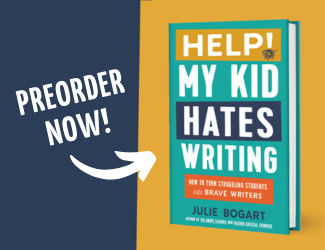Saturation and Incubation: Nurturing Young Writers
Writing starts off the page. You don’t want to ask for writing before your kids are good and ready to spill over onto the page. All of those writing books that give students topics are a waste of time (unless you happen to be one of the lucky ones with a child who loves to write and just needs a gentle nudge and away she goes!). Topics don’t generate writing. Having something to say does.
You can begin with the following process:
Set the timer for five minutes. Ask your child to jot down every single thing he or she knows a lot about. The list can contain surprising areas of expertise such as: “eating spaghetti, feeding the dog and flipping coins.” No censorship. Let it all come out.
Now look over the list with your kids. Ask them which ones “jump” off the page. Which topic is one that this child feels he or she knows a lot about and would like to know more about? Be sure that you are asking for a topic that the child is interested in developing. If he or she says, “I know a lot about stopping a bloody nose,” you can ask “Is that a topic you wish to know more about?” If not, then pass on to the next area of expertise.
Find one that your child thinks “I’d love to check out a movie on that topic” or “I can’t wait to look stuff up on the Internet about that topic.” That’s the right kind.

Next, in order to produce writing, it helps if you practice two important principles:
Saturation
To be saturated means that you are filled up to overflowing. Think of the sponge in your sink that you want to use to wipe the table. It does a lousy job if it is mostly dried out. But if you wet it to the point that it’s dripping, you can use it effectively.
Your kids want to be dripping with information.
Here’s how:
- Read books, online journals, magazines, and newspapers.
- Watch videos or movies that are about the topic of interest.
- Visit places that feature the topic (museums come to mind, but so do all those places where great topics take us, like a Chinese restaurant when writing about China, or a toy store if writing about toys at Christmas, or the horse stable where the writer takes lessons, or the neighborhood if writing about winter, or the skating rink when writing about skating, the observatory for a study of the stars…)
- Do the topic. For some topics, that’s not as easy (you can always perform a skit as Alexander Graham Bell, but it’s not necessarily helpful to writing). Still, if the topic is playing the X Box, then by golly, let the kid play. Paint or draw or compose or build or cook or bake or create. While participating in the activity, talk. Get to know the features of the topic.
- Meet people who know about the topic: Talk with the grocer, talk to a birder, ask questions of the astronomer, listen to a lecture by an art lover…
You won’t be able to do all of these this week. So focus on what you can do. Read, read, read. Watch, watch, watch. These are the easiest.
Incubation
Incubation is the time that a child gets to let the ideas percolate. It’s not enough to pour all this stuff in. It helps if it has time to become a part of the child. (And really, one week for any topic that is new is too short. I am assuming that the topic your child will write about this month will be based on something he or she already knows well and has already absorbed to some degree.)
If your child picks a topic that seems silly or not interesting to you, but is an area of expertise for the child (American Girl doll outfits, Lego creations, X Box games), don’t stop him or her. The key is that the child knows a lot about the topic, not that it interests you or fulfills some idea of what you consider a “schoolish” topic.
So use this week to read, watch movies and talk, talk, talk about the topic. Listen to your child. Ask meaningful questions.
If he or she starts talking about the topic in detail, jot down what you hear. You don’t need to make a big deal out of this. Just take a few notes so that you have raw materials for writing.
Later will come freewriting. For now, saturate and incubate!
Let your kids saturate themselves in content, incubate their ideas; natural freewriting will follow.
Top image by andy carter (cc cropped, text added)
Tags: nurturing writers



















[…] even though these same students have never read an essay in their lives. To write well, we need saturation, both with content for writing and in the format we plan to use. Kids write fiction more easily […]
[…] Writing Starts Off the Page: Saturation and Incubation […]